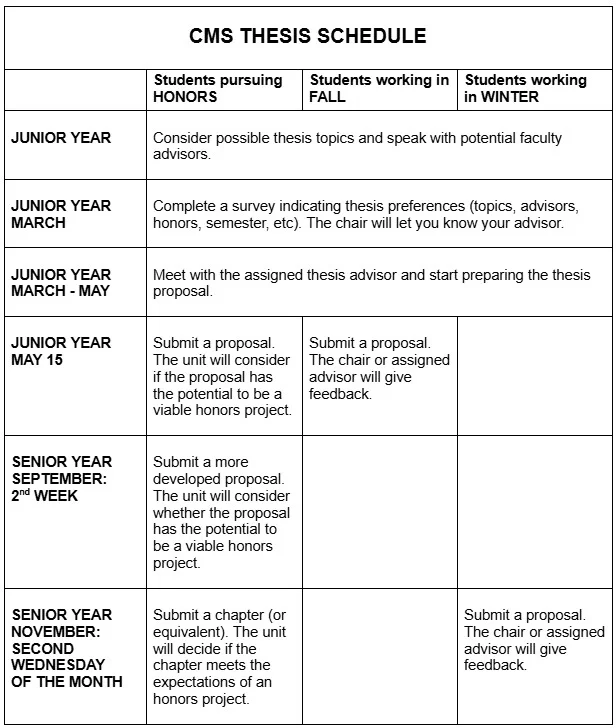CMS Senior Capstone Guidelines
A capstone project, whatever its form or emphasis, is an opportunity for in-depth research, artistic and intellectual risk-taking, and the development of an independent voice. Building on the skills and areas of expertise developed in coursework, most students complete a research paper. They narrow the scope of their inquiry to a particular time and place in the ancient and medieval worlds and select appropriate methods from history, art history, religion, anthropology, literary studies, archaeology, epigraphy, etc., to complete their capstone projects. While the CMS curriculum prepares students to undertake such a formal academic analysis of a chosen topic, students may propose to showcase their research in a digital, visual, or performance-based project or to draw on other literary genres. Students must have prior work and experience in their chosen field and format. All capstone projects require consistent independent work with an advisor and, except for honors, are completed in one semester. See CMS Senior Capstone: Standards. The following deadlines apply to all juniors and seniors, whether on campus or studying abroad.
TIMELINE FOR ONE-SEMESTER CAPSTONE PROJECTS
Students should consider possible capstone projects and speak with potential faculty advisors during their junior year, whether on campus or by email, if they are studying abroad. They do not need a precisely defined project when approaching a potential advisor. In March of the junior year, students will receive a brief survey asking them to describe possible capstone projects and advisors. Shortly thereafter, the chair will let them know who their advisor will be, and they may begin to work collaboratively on their project. The proposal is due on May 15 of the junior year for those working on their capstone project in the fall semester and on the Wednesday before Thanksgiving break in November of the senior year for those working on their capstone project in the winter semester.
TIMELINE FOR HONORS
Students who wish to complete an honors project must complete three steps within the program before they register in the honors program at the college level. 1) They submit a proposal on May 15 of their junior year. If their initial proposal is not approved, they complete a one-semester project during their senior year. If it is approved, they will continue to pursue honors. 2) Students submit a more developed proposal in the second week of September of their senior year. See CMS Senior Capstone: Honors. If their developed proposal is not approved, they complete a one-semester project in the fall semester of their senior year. If it is approved, they will continue to pursue honors. 3) Students submit a chapter or its equivalent on the Wednesday before Thanksgiving break. If their work is not approved, they complete a one-semester project in the fall semester of their senior year. If approved, they will continue their honors work and submit their name to the College Honors Committee at the appropriate time.
PROPOSAL
A proposal develops, focuses, and formalizes the ideas and questions of your project. It identifies the value of the project in the field of Classical and Medieval Studies and provides a “road map” for sustaining work for a semester.
1. PROJECT QUESTION(S)
A clear statement of the specific research question(s) and area of study or practice you will address in your capstone project. What leads you to pursue these questions, and what spheres of prior knowledge will you draw on in the project? What ancient or medieval materials will be the focus of your capstone? See CMS Senior Capstone: Examples on how to develop proposal questions, how to construct one area of exploration across two majors, sample capstone projects, and more.
2. FORMAT AND METHODOLOGY
Your proposal should include a brief description of your capstone project format that clarifies how it will showcase your research and analysis. How will writing a tragedy contribute to our understanding of Athenian notions of the family, and how might it translate ancient texts and scholarly literature to its audience? How might creating an amphora help you understand archaeological reports, scholarship on ancient ceramic materials and practices, and/or trade networks? How might your research on a medieval festival contribute to understanding medieval society and participating in a scholarly conversation about its significance? Your chosen format and ancient or medieval materials will determine your methods. What approach will you use to examine your question(s) and the evidence you have collected? How will this approach help you address and analyze your research question?
3. SUPPORTING SCHOLARLY LITERATURE
Your proposal must demonstrate that you have read and synthesized scholarship relevant to your project. Attach an alphabetized annotated bibliography that includes at least three single-authored books pertinent to your topic and four peer-reviewed scholarly articles or essays. Give full bibliographic citations for each source in either Chicago or MLA style. Annotations are summaries (four to six sentences) in which you outline the author’s central question and argument and state how the work has informed your proposal and will shape your project. Your annotations should indicate which sources are foundational studies of the issue you plan to explore. If necessary material is unavailable in the Ladd library or through inter-library loan, indicate how you will obtain it. The following online resources may help you locate and select your list of sources.
http://libguides.bates.edu/thesis_writers
http://libguides.bates.edu/Citation
http://libguides.bates.edu/cms
